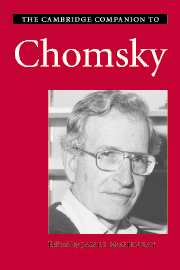Book contents
- Frontmatter
- Introduction
- Part I Chomsky on the human language
- Part II Chomsky on the human mind
- Part III Chomsky on values and politics
- 11 Market values and libertarian socialist values
- 12 The individual, the state, and the corporation
- 13 Noam Chomsky: the struggle continues
- 14 The responsibility of the intellectual
- Notes
- References
- Index
13 - Noam Chomsky: the struggle continues
from Part III - Chomsky on values and politics
Published online by Cambridge University Press: 28 May 2007
- Frontmatter
- Introduction
- Part I Chomsky on the human language
- Part II Chomsky on the human mind
- Part III Chomsky on values and politics
- 11 Market values and libertarian socialist values
- 12 The individual, the state, and the corporation
- 13 Noam Chomsky: the struggle continues
- 14 The responsibility of the intellectual
- Notes
- References
- Index
Summary
Introduction
“… no great power - not even one so selfless and beneficent as the United States - has the authority or the competence to determine by force the social and political structure of Vietnam or any other country, no right to serve as international judge and executioner” (Chomsky 1971b: 86). Noam Chomsky’s positionwas articulated with a characteristic blend of irony and blunt eloquence in his 1971 lecture in honor of Bertrand Russell. It was accompanied by his affirmation that “the radical reconstruction of society must search for ways to liberate the creative impulse, not to establish new forms of authority.”
To these guiding principles of Chomsky’s political thought, a third may be added, a commitment “to penetrate the clouds of deceit and distortion and learn the truth about the world, then to organize and act to change it” (1996a,b: 131). It is both a statement of purpose and a strategy for action. It defines Chomsky’s political work - his ongoing critique of US foreign policy, and his relentless exposé of “the clouds of deceit and distortion” designed to mask it. The result is a record of historical retrieval that has fundamentally altered what we know of US foreign policy. The Chomsky files testify to the power embedded in such retrieval. To engage in retrieval is to question who we are and what we know. It is to explain why we have accepted a distortion of history that is akin to its theft. And it is to face the responsibility of change.
- Type
- Chapter
- Information
- The Cambridge Companion to Chomsky , pp. 260 - 279Publisher: Cambridge University PressPrint publication year: 2005
- 1
- Cited by



